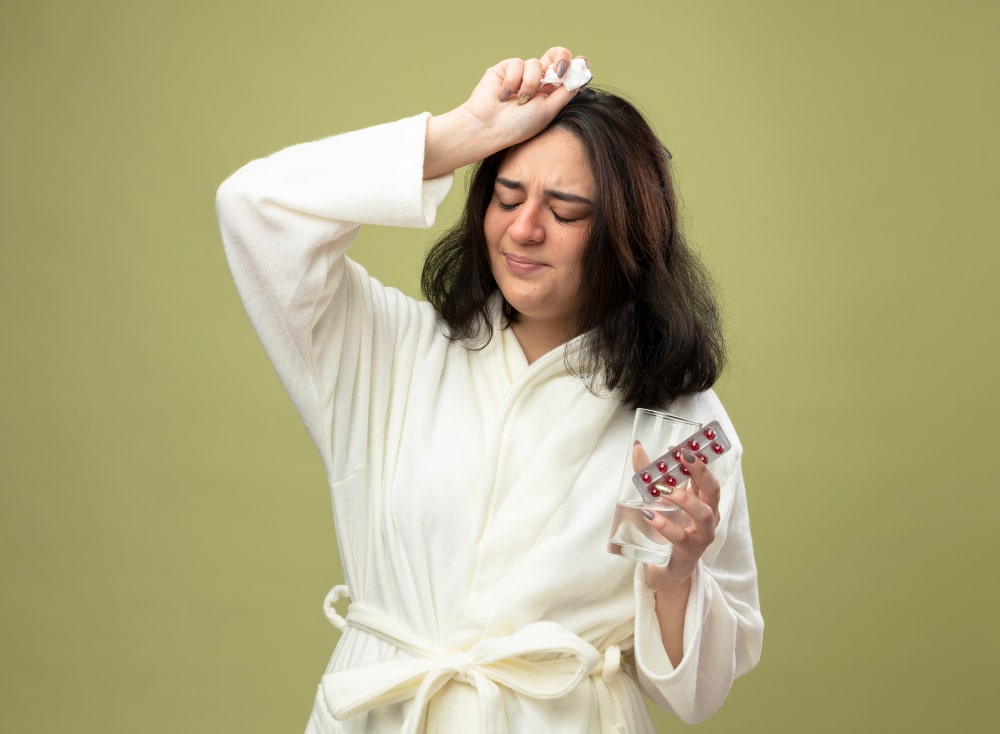Introduction
Hair loss, an issue that plagues millions worldwide, isn’t strictly tied to aging or genetics. Various other elements can be contributors, including specific vitamin deficiencies. A key yet often overlooked factor is vitamin deficiency. Let’s delve into the topic to understand which vitamin deficiency causes hair loss and how to address them.
Vitamin Deficiency Causes Hair Loss
1) Vitamin D Deficiency
Vitamin D plays a vital role in the proliferation and differentiation of cells, including hair follicles. It is essential for the formation of new hair strands. Evidently, a deficiency of vitamin D may disrupt the hair growth cycle, leading to hair thinning or loss. People with limited exposure to sunlight, the ageing, and those with darker skin are more prone to a deficiency in this vitamin.
2) B Vitamins Deficiency
B vitamins, specifically B7 (biotin), B12, and B6, play significant roles in promoting healthy hair. Biotin is often related to hair health due to its role in keratin production – the primary protein making up hair. Vitamin B12 deficiency can causes to hair loss since it affects the absorption of iron, another critical nutrient for hair growth. Similarly, a lack in vitamin B6 might result in hair loss due to its role in essential protein metabolism.

Read More: How to Dye Synthetic Hair: A Detailed Step-by-Step Guide
3) Iron Deficiency
Iron is crucial for delivering oxygen to cells needed for healthy hair follicles. Lower levels can affect the delivery of oxygen and nutrients to the hair follicles, impairing growth and leading to increased hair fall. Iron deficiency can result from various factors including poor diet, certain illnesses, or during menstrual periods in women.
4) Zinc Deficiency
Being a vital player in cellular metabolism, zinc influences hair growth by promoting healthy cell division and protein synthesis. Lower levels of zinc may lead to weak, brittle hair that falls out easily. Intense deficiencies can also cause alopecia, characterized by localized or complete absence of hair.
5) Protein Deficiency
Hair is primarily composed of protein, specifically keratin. Inadequate protein intake can disrupt the supply of the nutrient required for creating new hair follicles, resulting in hair loss.
Read More: How to Remove Hair From Anus Permanently?
6) Vitamin A Deficiency
While an excess intake of vitamin A can lead to hair loss, deficiencies are also problematic. Vitamin A aids in the production of sebum, a substance required for keeping the scalp and hair follicles healthy. Insufficiency might result in dry, itchy scalp or even hair loss.
7) Lack of Vitamin E
Vitamin E is renowned for its robust antioxidant properties, actively fighting against oxidative stress, which could be a significant cause of hair loss. Oxidative stress materializes when there’s an imbalance between free radicals and antioxidants in the body, leading to potential cellular structure impairments which, consequently, could cause hair loss. Studies have indicated that individuals suffering from hair loss usually have comparatively fewer Vitamin E levels than those who are not.
8) Shortage of Vitamin C
Vitamin C is not just an immune booster, it’s vital in collagen formation, a key ingredient in the structure of our hair. In addition to this, it aids in the absorption of iron, a critical mineral for lush and healthy hair growth. Moreover, its natural antioxidant properties help combat damaging oxidative stress which could lead to both hair loss and graying.
Read More: How to Stop Facial Hair Growth in Females Naturally?
9) Deficiency in Omega-3 and Omega-6 Fatty Acids
Although not classified as vitamins, these fatty acids are functional nutrients that our bodies demand, and they can only be ingested via our diet. Both Omega-3 and Omega-6 fatty acids are vital for healthy hair growth, possessing potent anti-inflammatory properties that help stimulate the hair follicles, leading to healthy hair growth.
10) Insufficient Folic Acid (Vitamin B9)
Folic acid is crucial for cell growth and division, with an insufficiency potentially leading to premature graying and hair loss. When folic acid levels are low, it undermines the hair follicles’ capacity for proper cell division and replication, thereby inhibiting hair growth and even speeding up hair graying. Foods like leafy green vegetables, oranges, and fortified cereals are rich in folic acid.
Conclusion
Emphasizing a balanced, nutrient-rich diet can contribute to improved hair health and potentially prevent hair loss associated with vitamin and mineral deficiencies. If hair loss persists, it may be beneficial to consult with a healthcare provider as vitamin deficiencies may indicate a more complex underlying issue. Always seek professional guidance before starting a new supplementation regimen.
Read More: How to Diffuse Curly Hair: Step-By-Step Guide
FAQs
Foods like fish, eggs, berries, spinach, and sweet potatoes are high in Vitamins like A, C, D, E, and Biotin. For iron, you can consume poultry, meat, fish, legumes, and green leafy vegetables.
Although supplements can help if you have a deficiency, it’s best to consult your doctor or a nutritionist about your dietary needs before starting any supplement regimen.
In some cases, addressing a vitamin or mineral deficiency can help the hair regain its normal growth cycle. However, everyone is different, and the results can vary based on the individual and the cause of hair loss.

